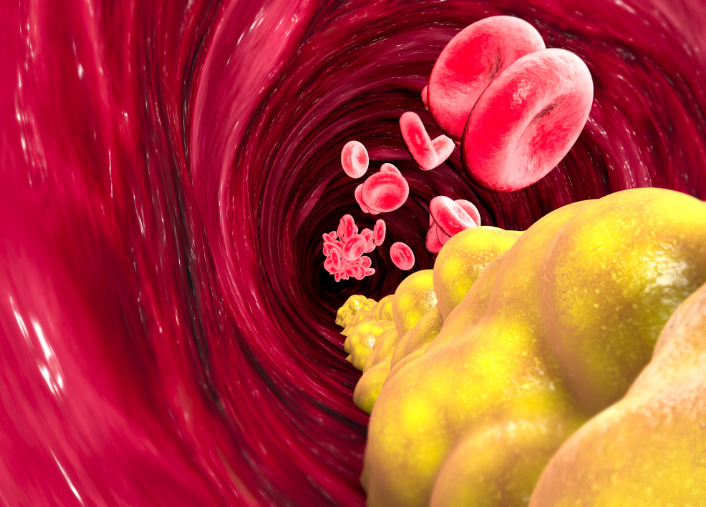How Can Genetics Influence Cholesterol Levels?
Aira
on
February 2, 2024

Latest Posts
Table of Contents
How Can Genetics Influence Cholesterol Levels?
Date of Content: January 11, 2024
Written by: Harvey Talento
Reviewed by: Maarit Tiirikainen, PhD
Understanding Cholesterol
Cholesterol is indispensable for human life, orchestrating various roles behind the scenes to ensure the smooth functioning of our cells. Serving as a fundamental structural component of cell membranes, it also takes center stage in the creation of vitamin D, and essential hormones, and plays a pivotal role in the digestion process.
This vital molecule, due to its aversion to water, relies on lipoproteins as its transport vehicles within the bloodstream, hitching a ride alongside triglycerides. Lipoprotein analysis in clinical settings aids in estimating the cholesterol levels in our blood. Additionally, maintaining the delicate balance of cholesterol is paramount for heart health.
Elevated cholesterol levels, along with markers like C-reactive protein (CRP), can have significant implications, underscoring the importance of actively managing and sustaining optimal cholesterol levels.

Good vs. Bad Cholesterol
Good and bad “cholesterol” actually refer to two types of lipoproteins that carry cholesterol in the blood.
- LDL (low-density lipoprotein) is sometimes called “bad cholesterol” because it can build up in the walls of the arteries and form plaques, which can narrow the blood vessels and increase the risk of heart disease and stroke.
- HDL (high-density lipoprotein) is sometimes called “good cholesterol” because it can help remove excess cholesterol from the blood and carry it back to the liver, where it is broken down and eliminated from the body. This can lower the risk of heart disease and stroke.
Additionally, triglycerides are another type of fat in the blood that can also affect the risk of heart disease and stroke. High levels of triglycerides, especially when combined with low HDL or high LDL, can increase the risk of fatty buildup in the arteries.
The Role of Cholesterol in the Body
Cholesterol is not always the villain it is portrayed to be. It is a vital substance that our bodies produce and use for various functions. Cholesterol is also found in some foods, mainly animal products, that we consume.
The body relies on cholesterol to:
- Contribute to the construction of new tissue and mend damage in existing tissue
- Play a role in the production of steroid hormones, including estrogen
- Assist in the creation of bile in the liver
- Facilitate the production of vitamin D
However, despite these vital roles, an excess of (“bad”) cholesterol can pose serious risks, potentially leading to life-threatening conditions like cardiovascular disease and kidney issues. Balancing cholesterol levels is essential for overall health.
Genetics of Cholesterol Levels
Genetic factors may play a crucial role in determining cholesterol levels and inflammation in the body, both of which are linked to cardiovascular health.
Previous studies have identified several genes that influence the levels of high-density lipoprotein (HDL) and low-density lipoprotein (LDL) cholesterol, as well as C-reactive protein (CRP), a marker of inflammation.
ABO Gene
Interestingly, while ABO gene variation is more known as forming the basis for ABO blood groups, The ABO gene also plays a crucial role in regulating LDL cholesterol levels, as indicated by a genome-wide association study (GWAS) involving 94,674 individuals. This study revealed evidence of genetic dominance and epistatic interaction with the FUT2 gene at the ABO gene (at SNP rs2519093), highlighting its impact on the complexity of genetic influences on lipid metabolism.
STAG1 Gene
STAG1 reveals potential pleiotropic effects, influencing both the CRP and HDL cholesterol levels. The bivariate GWAS revealed the SNP rs7621025, located near STAG1, as a significant player in the shared biology of chronic inflammation and lipid metabolism. The subsequent replication analysis validated its association with both CRP and HDL cholesterol, emphasizing its role in orchestrating genetic harmony between these two crucial physiological markers.
FTO Gene
The FTO gene plays a role in cholesterol levels. Through a comprehensive GWAS analysis, the SNP rs1558902 near FTO emerged as a significant genetic marker influencing HDL. The FTO gene is known as the “obesity gene” and this finding highlights the importance of the FTO gene variation and the total lipid status for overall health.
These genetic insights offer a direct view into the genes influencing HDL and LDL cholesterol, as well as the known inflammation marker CRP levels, contributing to a deeper understanding of the genetic foundations of cardiovascular health.
Non-Genetic Factors Influencing Cholesterol Levels
While genetics play a role in cholesterol levels, there are also several other factors that genes can interact with. Understanding these factors is crucial for proactive health management. Below are some key contributors to be mindful of.
Lifestyle Habits
Unhealthy lifestyle habits significantly contribute to imbalanced cholesterol levels. Consuming foods high in saturated fats, such as fatty cuts of meat and certain dairy products, elevates LDL cholesterol. It is recommended that no more than 10% of daily calories come from saturated fats. Lack of physical activity, smoking, chronic stress, and excessive alcohol consumption further disrupt cholesterol balance. Adopting heart-healthy lifestyle changes, including a balanced diet and regular exercise, is pivotal in managing and preventing unfavorable cholesterol levels.
Medications
Certain medications prescribed for various health concerns can influence cholesterol levels. Medications such as beta-blockers, diuretics, immunosuppressive drugs, chemotherapy agents, retinoids, and steroids may raise LDL cholesterol or lower HDL cholesterol. Individuals taking these medications should be aware of their potential impact on cholesterol and work with healthcare providers to monitor and manage cholesterol levels effectively.
Age
Age-related changes in metabolism can affect cholesterol regulation. As individuals age, the liver may become less efficient at removing LDL cholesterol, increasing the risk of high cholesterol. High total cholesterol can affect individuals of all ages, including young children, but it is most commonly diagnosed in people between the ages of 40 and 59. Understanding the normal age-related changes in cholesterol metabolism is essential for addressing cholesterol concerns as one gets older.
Race or Ethnicity
Race or ethnicity can influence cholesterol levels, with variations observed among different groups. Non-Hispanic white individuals are more likely to have high total cholesterol, while Asian Americans may have elevated levels of LDL cholesterol. Hispanic Americans often exhibit lower levels of HDL cholesterol, and African Americans are more likely to have higher levels of HDL cholesterol but may face other risk factors, such as high blood pressure and diabetes.
Gender
Cholesterol levels vary between genders and across different life stages. Men between the ages of 20 and 39 generally have a higher risk of high total cholesterol. However, women’s risk increases after menopause, as hormonal changes lead to higher total and LDL cholesterol levels, along with lower levels of protective HDL cholesterol. Understanding these gender-specific patterns is crucial for tailoring cholesterol management strategies.
Lifestyle Changes to Manage Cholesterol Levels
Managing cholesterol levels involves a combination of dietary changes, physical activity, and lifestyle modifications. Here are some ways to manage your cholesterol levels:
- Eat heart-healthy foods: A few changes in your diet can reduce total cholesterol and improve your heart health:
- Reduce saturated fats – Found primarily in red meat and full-fat dairy products, these raise your total cholesterol.
- Eliminate trans fats – Often used in margarine and store-bought cookies, crackers, and cakes, trans fats raise overall cholesterol levels.
- Eat foods rich in omega-3 fatty acids – Foods with omega-3 fatty acids, such as salmon, mackerel, herring, walnuts, and flaxseeds, have heart-healthy benefits, including reducing blood pressure.
- Increase soluble fiber – Soluble fiber, found in foods like oatmeal, kidney beans, Brussels sprouts, apples, and pears, can reduce the absorption of cholesterol into your bloodstream.
- Exercise regularly: Moderate physical activity can help raise high-density lipoprotein (HDL) cholesterol, the “good” cholesterol. Aim for at least 30 minutes of exercise five times a week or vigorous aerobic activity for 20 minutes three times a week.
- Quit smoking: Quitting smoking improves your HDL cholesterol level.
- Maintain a healthy weight: Carrying even a few extra pounds can contribute to high total cholesterol.
- Drink alcohol only in moderation: Excessive drinking can lead to serious health problems, including high blood pressure, heart failure, and strokes.
Remember, it’s always a good idea to consult with a healthcare professional before making significant changes to your diet or exercise routine. They can provide personalized advice based on your current health status and medical history.
About the LifeDNA Vitamins and Supplements Report
Uncover the intricacies of your genetic makeup and its impact on your cholesterol levels with the LifeDNA Vitamins and Supplements Report. This comprehensive report delves into your unique genetic traits, providing valuable insights into HDL and LDL cholesterol levels. The HDL Levels Trait Report and LDL Levels Trait Report offer a detailed understanding of how your genes may influence your body’s “good” and “bad” cholesterol and offer recommendations for how to optimize your cholesterol levels.
Don’t miss out on this opportunity to take charge of your well-being. Get your LifeDNA Vitamins and Supplements Report today and embark on a journey towards a healthier, genetically-informed lifestyle. Your unique genetic insights await – start your proactive health management today.
Summary
- Cholesterol, a crucial molecule for human life, serves various roles in the human body. Maintaining balanced cholesterol levels is vital for overall health.
- The distinction between LDL (bad) and HDL (good) cholesterol plays an important role in heart health. LDL can contribute to plaque formation, while HDL helps remove excess cholesterol, reducing the risk of heart disease.
- Cholesterol, often misunderstood, is essential for tissue repair, hormone production, bile creation, and vitamin D synthesis. While beneficial, excess cholesterol poses risks, emphasizing the importance of balance.
- Genetic factors significantly impact cholesterol levels. Studies identify genes like ABO, FUT2, STAG1, and FTO, shedding light on their roles in lipid metabolism and inflammation.
- Lifestyle habits, medications, age, race/ethnicity, and gender contribute to cholesterol variations. Understanding these factors is crucial for proactive health management.
- Adopting heart-healthy habits, including a balanced diet, regular exercise, and avoiding smoking and excessive alcohol, is key to managing cholesterol.
References
- https://pubmed.ncbi.nlm.nih.gov/29262185/
- https://www.cdc.gov/cholesterol/ldl_hdl.htm
- https://www.heart.org/en/health-topics/cholesterol/hdl-good-ldl-bad-cholesterol-and-triglycerides
- https://www.cdc.gov/cholesterol/ldl_hdl.htm
- https://www.heart.org/en/health-topics/cholesterol/hdl-good-ldl-bad-cholesterol-and-triglycerides
- https://www.heart.org/en/health-topics/cholesterol/hdl-good-ldl-bad-cholesterol-and-triglycerides
- https://www.medicalnewstoday.com/articles/what-is-the-function-of-cholesterol-in-the-body#cholesterol-types
- https://www.nature.com/articles/s41588-018-0064-5
- https://bmcgenomics.biomedcentral.com/articles/10.1186/s12864-016-2712-4
- https://bmcgenomics.biomedcentral.com/articles/10.1186/s12864-016-2712-4
- https://www.frontiersin.org/articles/10.3389/fgene.2020.559138/full
- https://www.nhlbi.nih.gov/health/blood-cholesterol/causes
- https://www.nhlbi.nih.gov/health/blood-cholesterol/causes
- https://www.nhlbi.nih.gov/health/blood-cholesterol/causes
- https://www.nhlbi.nih.gov/health/blood-cholesterol/causes
- https://www.nhlbi.nih.gov/health/blood-cholesterol/causes
Customer Reviews




*Understanding your genetics can offer valuable insights into your well-being, but it is not deterministic. Your traits can be influenced by the complex interplay involving nature, lifestyle, family history, and others.
Our reports have not been evaluated by the Food and Drug Administration. The contents on our website and our reports are for informational purposes only, and are not intended to diagnose any medical condition, replace the advice of a healthcare professional, or provide any medical advice, diagnosis, or treatment. Consult with a healthcare professional before making any major lifestyle changes or if you have any other concerns about your results. The testimonials featured may have used more than one LifeDNA or LifeDNA vendors’ product or reports.
- Category: Immunity & Vitamins



